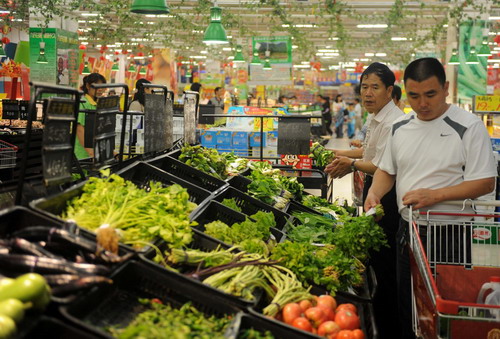China's inflation expected to remain high
Updated: 2011-08-03 14:40
(Xinhua)
|
|||||||||||
|
 |
|
Customers buy vegetables in a supermarket in Nanchang, Jiangxi province, June 14, 2011. [Photo / Xinhua] |
The consumer price index, a main gauge of inflation, will climb to 6.5 percent year-on-year in July after hitting a three-year high of 6.4 percent in June. But this may not be the highest in the year, said Lu Zhengwei, analyst with the Industrial Bank.
Fueled by rising food prices, especially the price of grain, seafood, eggs and imported staple foods, July's CPI coudl reach 6.7 percent, according to Shenyin & Wanguo Securities.
Meanwhile, Peng Wensheng, analyst with China International Capital Corp, expected the CPI to retreat moderately to 6.3 percent in July, as pork prices, the major cause of inflation over the past two months, have started falling and prices of some vegetables have dropped more than 10 percent since the middle of July, Ministry of Commerce data shows.
Expecting month-on-month increases of food prices, especially vegetable prices, to drop significantly, GF Securities said the year-on-year CPI in July will fall to 6 percent.
According to Lu, the persistent high inflation will trigger another interest rate hike in August.
Lu expected the economy to slow as industrial value-added output, which measures the final results of industrial production, may fall to 14.6 percent in July, down from 15.1 percent in June.
But the slower growth will help contain consumer prices in the fourth quarter, Lu said.
July's key economic indexes including CPI and industrial value-added output are due to be released on August 9.
To rein in the rising inflation, the People's Bank of China, or the central bank, has raised the benchmark interest rate three times and the reserve requirement ratio six times this year.